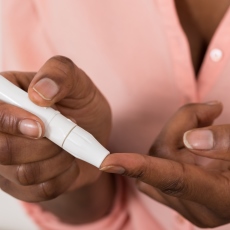
Blood Sugar
Also called: Blood glucose
National Institutes of Health
Other Languages
Blood sugar, or glucose, is the main sugar found in your blood. It comes from the food you eat, and is your body's main source of energy. Your blood carries glucose to all of your body's cells to use for energy.
Diabetes is a disease in which your blood sugar levels are too high. Over time, having too much glucose in your blood can cause serious problems. Even if you don't have diabetes, sometimes you may have problems with blood sugar that is too low or too high. Keeping a regular schedule of eating, activity, and taking any medicines you need can help.
If you do have diabetes, it is very important to keep your blood sugar numbers in your target range. You may need to check your blood sugar several times each day. Your health care provider will also do a blood test called an A1C. It checks your average blood sugar level over the past three months. If your blood sugar is too high, you may need to take medicines and/or follow a special diet.
NIH: National Institute of Diabetes and Digestive and Kidney Diseases
- A1C Test and Diabetes
 (National Institute of Diabetes and Digestive and Kidney Diseases)
(National Institute of Diabetes and Digestive and Kidney Diseases) - A1C: MedlinePlus Health Topic
 (National Library of Medicine)
(National Library of Medicine) - Blood Glucose Test
 (National Library of Medicine)Also in Spanish
(National Library of Medicine)Also in Spanish - Diagnosis of Diabetes and Prediabetes
 (National Institute of Diabetes and Digestive and Kidney Diseases)Also in Spanish
(National Institute of Diabetes and Digestive and Kidney Diseases)Also in Spanish
- A1C and eAG (American Diabetes Association)Also in Spanish
- Blood Glucose Monitoring Devices (Food and Drug Administration)
- Blood Glucose Record (Nemours Foundation)
- Managing Diabetes: New Technologies Can Make It Easier
 (National Institutes of Health)Also in Spanish
(National Institutes of Health)Also in Spanish - Monitor blood glucose - slideshow (Medical Encyclopedia)Also in Spanish
- Monitoring (American Association of Diabetes Educators)
- Self-Blood Glucose Monitoring in Diabetes Mellitus (Beyond the Basics) (UpToDate)
- Tight Diabetes Control (American Diabetes Association)Also in Spanish
- What Is the Difference Between Hyperglycemia and Hypoglycemia?(American Foundation for the Blind)
- Diabetes and Exercise: When to Monitor Your Blood Sugar(Mayo Foundation for Medical Education and Research)
- Genetics Home Reference: Donohue syndrome
 (National Library of Medicine)
(National Library of Medicine) - Genetics Home Reference: Rabson-Mendenhall syndrome
 (National Library of Medicine)
(National Library of Medicine) - Genetics Home Reference: type A insulin resistance syndrome
 (National Library of Medicine)
(National Library of Medicine)
- Age-Adjusted Percentage of Adults Aged 18 Years or Older with Diagnosed Diabetes Performing Daily Self-Monitoring of Blood Glucose, United States, 1994-2010(Centers for Disease Control and Prevention)
- Patient Access to Research (American Diabetes Association)
- ClinicalTrials.gov: Blood Glucose
 (National Institutes of Health)
(National Institutes of Health)
- Article: Favorable glycemic response after pancreatoduodenectomy in both patients with pancreatic...
- Article: VEGF levels in plasma in relation to metabolic control, inflammation,...
- Article: Mechanisms in endocrinology: Antipsychotic medication and type 2 diabetes and...
- Blood Sugar -- see more articles
- Diabetes: Glossary of Terms (Centers for Disease Control and Prevention)
- American Diabetes Association
- Find a Diabetes Educator (American Association of Diabetes Educators)
- National Diabetes Education Program

- National Institute of Diabetes and Digestive and Kidney Diseases

- Blood Test: Glucose (Nemours Foundation)Also in Spanish
- Diabetes Control: Why It's Important (For Kids) (Nemours Foundation)Also in Spanish
- Keeping Track of Your Blood Sugar (For Kids) (Nemours Foundation)Also in Spanish
- Monitoring Blood Sugar: The Importance of Checking Blood Sugar Levels (Nemours Foundation)
- Keeping Track of Your Blood Sugar (Nemours Foundation)Also in Spanish
- Your Glucose Meter
 (Food and Drug Administration)Also in Spanish
(Food and Drug Administration)Also in Spanish
- A1C test (Medical Encyclopedia)Also in Spanish
- Blood sugar test - blood (Medical Encyclopedia)Also in Spanish
- Continuous Glucose Monitoring
 (National Institute of Diabetes and Digestive and Kidney Diseases) - PDF
(National Institute of Diabetes and Digestive and Kidney Diseases) - PDF - Glucose screening and tolerance tests during pregnancy (Medical Encyclopedia)Also in Spanish
- Glycemic index and diabetes (Medical Encyclopedia)Also in Spanish
- Home blood sugar testing (Medical Encyclopedia)Also in Spanish
- Know Your Blood Sugar Numbers: Use Them to Manage Your Diabetes

 (National Diabetes Education Program)Also in Spanish
(National Diabetes Education Program)Also in Spanish - Managing your blood sugar (Medical Encyclopedia)Also in Spanish





















.png)












No hay comentarios:
Publicar un comentario